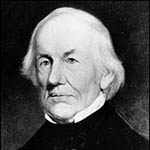Laurent Clerc
French-American deaf educator
Louis Laurent Marie Clerc (26 December 1785 – 18 July 1869) was a deaf teacher and co-founder, with Thomas Hopkins Gallaudet, of the first school for the deaf in North America, the Hartford Asylum for the Education and Instruction of the Deaf and Dumb (now the American School for the Deaf), the oldest existing school for the deaf in North America.

Quotes
edit- Every creature, every work of God, is admirably well made; but if any one appears imperfect in our eyes, it does not belong to us to criticise it. Perhaps that which we do not find right in its kind, turns to our advantage, without our being able to perceive it. Let us look at the state of the heavens, one while the sun shines, another time it does not appear; now the weather is fine; again it is unpleasant; one day is hot, another is cold; another time it is rainy, snowy or cloudy; every thing is variable and inconstant. Let us look at the surface of the earth: here the ground is flat; there it is hilly and mountainous; in other places it is sandy; in others it is barren; and elsewhere it is productive. Let us, in thought, go into an orchard or forest. What do we see? Trees high or low, large or small, upright or crooked, fruitful or unfruitful. Let us look at the birds of the air, and at the fishes of the sea, nothing resembles another thing. Let us look at the beasts. We see among the same kinds some of different forms, of different dimensions, domestic or wild, harmless or ferocious, useful or useless, pleasing or hideous. Some are bred for men's sakes; some for their own pleasures and amusements; some are of no use to us. There are faults in their organization as well as in that of men. Those who are acquainted with the veterinary art, know this well; but as for us who have not made a study of this science, we seem not to discover or remark these faults. Let us now come to ourselves. Our intellectual faculties as well as our corporeal organization have their imperfections. There are faculties both of the mind and heart, which education improve; there are others which it does not correct. I class in this number, idiotism, imbecility, dulness. But nothing can correct the infirmities of the bodily organization, such as deafness, blindness, lameness, palsy, crookedness, ugliness. The sight of a beautiful person does not make another so likewise, a blind person does not render another blind. Why then should a deaf person make others so also? Why are we Deaf and Dumb? Is it from the difference of our ears? But our ears are like yours; is it that there may be some infirmity? But they are as well organized as yours. Why then are we Deaf and Dumb? I do not know, as you do not know why there are infirmities in your bodies, nor why there are among the human kind, white, black, red and yellow men. The Deaf and Dumb are everywhere, in Asia, in Africa, as well as in Europe and America. They existed before you spoke of them and before you saw them.
- Statement of 1818, quoted in Through Deaf Eyes: A Photographic History of an American Community (2007) by Douglas C. Baynton, Jack R. Gannon, and Jean Lindquist Bergey
- Science is a most useful thing for us all. It is one of the most useful ornaments of man. There is no dress which embellishes the body more than science does the mind.
- Statement of 1864, quoted in Pamphlets on the Deaf, Dumb & Blind
- Every decent man, and every real gentleman in particular, ought to apply himself, above all things, to the study of his native language, so as to express his ideas with ease and gracefulness.
- Statement of 1864, quoted in Pamphlets on the Deaf, Dumb & Blind